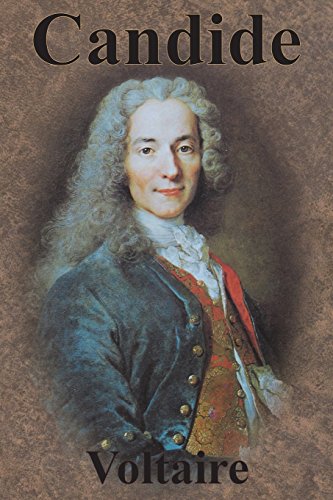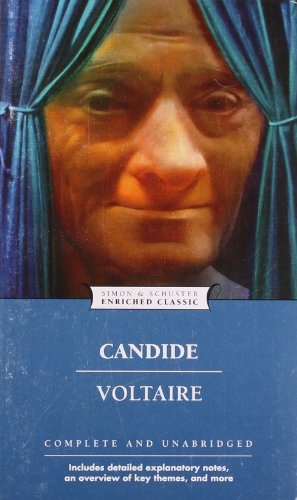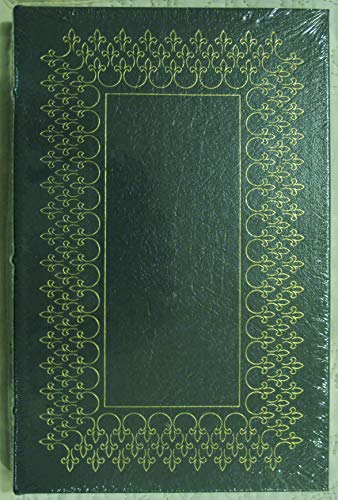-
Candide
Voltaire
Paperback (Value Classic Reprints, Jan. 11, 2017)Unabridged English value reproduction of Candide by Voltaire, is a book that belongs on the shelf of those desiring to contemplate life. Voltaire subtly challenges the reader’s complacent view of the world through extreme, and often gruesome, exaggeration.Written in 1759, it tells the story of Candide, who gets kicked out of the castle, forced to serve on a boat, shipwrecked, robbed, tortured, and on and on, without losing his desire to continue forward in life.This Value Classic Reprint provides a slim volume with full text at an affordable price.
-
Candide
Voltaire
Mass Market Paperback (Simon & Schuster, June 1, 2005)Enriched Classics offer readers accessible editions of great works of literature enhanced by helpful notes and commentary. Each book includes educational tools alongside the text, enabling students and readers alike to gain a deeper and more developed understanding of the writer and their work.A classic work of eighteenth century literature, Candide is Voltaire’s fast-paced novella of struggle and adventure that used satire as a form of social critique. Candide enlists the help of his tutor, Dr. Pangloss, to help him reunite with his estranged lover, Lady Cunegonde. But the journey welcomes many unexpected challenges, and overcoming or outwitting the dangers of the world shall be their greatest task. Enriched Classics enhance your engagement by introducing and explaining the historical and cultural significance of the work, the author’s personal history, and what impact this book had on subsequent scholarship. Each book includes discussion questions that help clarify and reinforce major themes and reading recommendations for further research. Read with confidence.
-
Candide
Voltaire
Leather Bound (Easton Press, March 15, 1977)Collector's Edition Bound in Genuine Leather.
-
Micromegas
Voltaire
eBook (Jovian Press, Dec. 13, 2017)Micromégas is a 1752 novella by the French philosopher and satirist Voltaire. Along with his story "Plato's Dream", it is a seminal work in the genre of science fiction, and is a significant development in the history of literature. The tale recounts the visit to Earth of a being from a planet circling the star Sirius, and of his companion from the planet Saturn.
-
Candide
Voltaire
Hardcover (Value Classic Reprints, Jan. 11, 2017)Unabridged English value reproduction of Candide by Voltaire, is a book that belongs on the shelf of those desiring to contemplate life. Voltaire subtly challenges the reader’s complacent view of the world through extreme, and often gruesome, exaggeration.Written in 1759, it tells the story of Candide, who gets kicked out of the castle, forced to serve on a boat, shipwrecked, robbed, tortured, and on and on, without losing his desire to continue forward in life.This Value Classic Reprint provides a slim volume with full text at an affordable price.
-
Candide
Voltaire
Paperback (CreateSpace Independent Publishing Platform, March 25, 2016)Candide, ou l'Optimisme is a French satire first published in 1759 by Voltaire, a philosopher of the Age of Enlightenment. The novella has been widely translated, with English versions titled Candide: or, All for the Best (1759); Candide: or, The Optimist (1762); and Candide: or, Optimism (1947). It begins with a young man, Candide, who is living a sheltered life in an Edenic paradise and being indoctrinated with Leibnizian optimism (or simply "optimism") by his mentor, Professor Pangloss. The work describes the abrupt cessation of this lifestyle, followed by Candide's slow, painful disillusionment as he witnesses and experiences great hardships in the world. Voltaire concludes with Candide, if not rejecting optimism outright, advocating a deeply practical precept, "we must cultivate our garden", in lieu of the Leibnizian mantra of Pangloss, "all is for the best" in the "best of all possible worlds". Candide is characterised by its sarcastic tone as well as by its erratic, fantastical and fast-moving plot. A picaresque novel with a story similar to that of a more serious Bildungsroman, it parodies many adventure and romance clichés, the struggles of which are caricatured in a tone that is mordantly matter-of-fact. Still, the events discussed are often based on historical happenings, such as the Seven Years' War and the 1755 Lisbon earthquake. As philosophers of Voltaire's day contended with the problem of evil, so too does Candide in this short novel, albeit more directly and humorously. Voltaire ridicules religion, theologians, governments, armies, philosophies, and philosophers through allegory; most conspicuously, he assaults Leibniz and his optimism. As expected by Voltaire, Candide has enjoyed both great success and great scandal. Immediately after its secretive publication, the book was widely banned because it contained religious blasphemy, political sedition and intellectual hostility hidden under a thin veil of naïveté. However, with its sharp wit and insightful portrayal of the human condition, the novel has since inspired many later authors and artists to mimic and adapt it. Today, Candide is recognized as Voltaire's magnum opus and is often listed as part of the Western canon; it is among the most frequently taught works of French literature. The British poet and literary critic Martin Seymour-Smith listed Candide as one of the 100 most influential books ever written.
-
Candide
Voltaire
Paperback (CreateSpace Independent Publishing Platform, June 15, 2018)One of the great works of Western literature, Voltaire’s Candide is a picaresque tale with profound philosophical underpinnings. Its plot, which sees the eponymous hero experience one calamity after another, elegantly delineates Voltaire’s belief that no matter what may befall us, ‘all is for the best in this best of all possible worlds.’
-
Candide
Voltaire
Hardcover (Wisehouse Classics, Sept. 20, 2017)"CANDIDE, OU L'OPTIMISME" is a French satire first published in 1759 by Voltaire, a philosopher of the Age of Enlightenment. It begins with a young man, Candide, who is living a sheltered life in an Edenic paradise and being indoctrinated with Leibnizian optimism (or simply "optimism") by his mentor, Professor Pangloss. The work describes the abrupt cessation of this lifestyle, followed by Candide's slow, painful disillusionment as he witnesses and experiences great hardships in the world. Voltaire concludes with Candide, if not rejecting optimism outright, advocating a deeply practical precept, "we must cultivate our garden," in lieu of the Leibnizian mantra of Pangloss, "all is for the best" in the "best of all possible worlds." Candide is characterised by its sarcastic tone as well as by its erratic, fantastical and fast-moving plot. A picaresque novel with a story similar to that of a more serious Bildungs-roman, it parodies many adventure and romance cliches, the struggles of which are caricatured in a tone that is mordantly matter-of-fact. Still, the events discussed are often based on historical happenings, such as the Seven Years' War and the 1755 Lisbon earthquake. As philosophers of Voltaire's day contended with the problem of evil, so too does Candide in this short novel, albeit more directly and humorously. Voltaire ridicules religion, theologians, governments, armies, philosophies, and philosophers through allegory; most conspicuously, he assaults Leibniz and his optimism. As expected by Voltaire, Candide has enjoyed both great success and great scandal. Immediately after its secretive publication, the book was widely banned because it contained religious blasphemy, political sedition and intellectual hostility hidden under a thin veil of naivete. However, with its sharp wit and insightful portrayal of the human condition, the novel has since inspired many later authors and artists to mimic and adapt it. Today, Candide is recognized as Voltaire's magnum opus and is often listed as part of the Western canon; it is among the most frequently taught works of French literature. The British poet and literary critic Martin Seymour-Smith listed Candide as one of the 100 most influential books ever written."
-
Voltaire's Candide Zadig and Selected Stories
Voltaire
(Indiana Univ Pr, June 1, 1961)None
-
Candide
Voltaire
Paperback (CreateSpace Independent Publishing Platform, Jan. 13, 2014)Ever since 1759, when Voltaire wrote "Candide" in ridicule of the notion that this is the best of all possible worlds, this world has been a gayer place for readers. Voltaire wrote it in three days, and five or six generations have found that its laughter does not grow old. "Candide" has not aged. Yet how different the book would have looked if Voltaire had written it a hundred and fifty years later than 1759. It would have been, among other things, a book of sights and sounds. A modern writer would have tried to catch and fix in words some of those Atlantic changes which broke the Atlantic monotony of that voyage from Cadiz to Buenos Ayres. When Martin and Candide were sailing the length of the Mediterranean we should have had a contrast between naked scarped Balearic cliffs and headlands of Calabria in their mists. We should have had quarter distances, far horizons, the altering silhouettes of an Ionian island. Colored birds would have filled Paraguay with their silver or acid cries.
-
Candide
Voltaire
Paperback (Tark Classic Fiction, Feb. 2, 2009)A philosopher and his disciple journey to find "the best of all possible worlds" in this classic work of eighteenth century satire.
-
Candide, Zadig, and selected stories
Voltaire
Paperback (Indiana University Press, Jan. 1, 1961)None